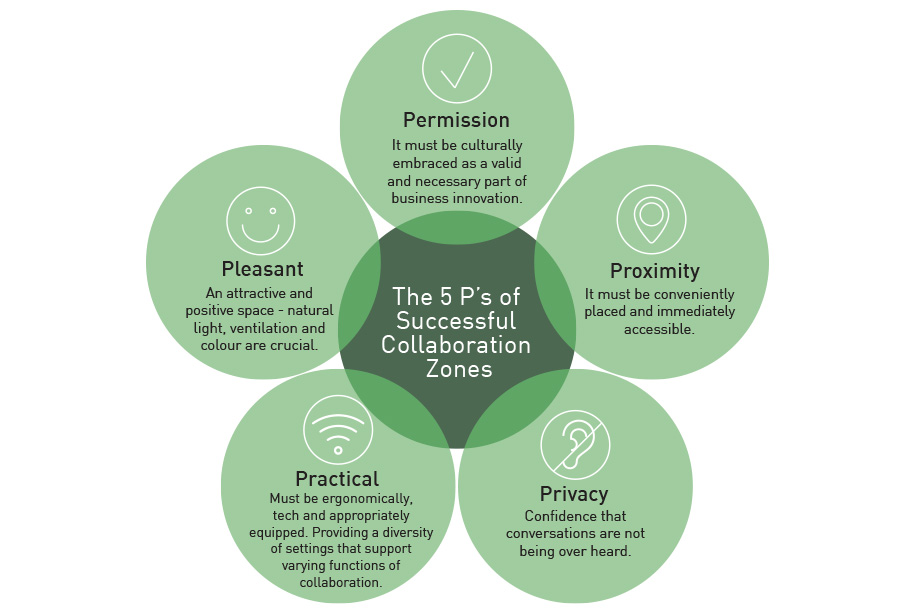Rear view series final #6: Collaboration or Distraction
Written in 2008:
In our modern, knowledge-based economy, a common goal for business is to increase collaboration. But are we solving the wrong problem? Our partners’ brief always includes: “we want improved communication and increased collaboration within our new workplace”. Collaboration has become cliché. We need to understand just why collaboration is so sought after.
The intention of collaboration is well founded in unlocking and unleashing the maximum potential of collective knowledge and resource. Its purpose is to leverage the power of a team to realise an outcome that is greater than the sum of its parts. However, for collaboration to bear meaningful fruit, it needs to be controlled and managed. Simply putting some cool furniture in leftover space where people can “communicate and collaborate” will very rarely, if ever, provide meaningful output. Collaborative space, as a minimum, needs to include all of the 5 P’s (see diagram) to have a chance of yielding valuable outcomes.
Gathering is not collaborating. Putting people in a room, no matter how well designed, without a purpose they value, or a sensible agenda, or any emotional buy-in, will not garner the personal investment required to achieve the desired solution. If the discourse is not controlled within the agreed cultural boundaries, then we do not unearth the hidden gems from the brightest people, but are instead subjected to the “squeakiest wheels” monologue.
Timing is critical to meaningful collaboration. What are the chances of having two people in the perfect mindset and simpatico at any given moment in time in order to create magic? As hard as that is, now try and get 6-12 individuals ready and in harmony at one moment. The reality of that happening is highly unlikely, however, we still insist on demanding “collaboration”. Management forces people out of “flow” to meet an agenda that suits them and not when it suits the individual to contribute meaningfully.
We need to understand the collateral damage and opportunity cost for taking people out of flow to “collaborate”. Having too many meetings is the scourge of the modern workplace. The most productive work happens when individuals are given the time, space and permission to engage deeply in the problem or opportunity at hand.
Creative and innovative thinking happens on its own time frame and certainly does not happen on demand. We need to ensure that business does not insist upon over collaboration for the sake of it. Organisations that are looking to unlock the full potential of their team, need to provide enough quiet undisturbed space, along with the cultural permissions that will create the environment for flow. This helps unlock the power of the introvert or outliers ahead of the dumbed down and “averaged” crowd sourced ideas.
In conjunction with quiet individual space, there needs to be communal space where creative friction can exist in a “safe” environment and can emerge organically. These spaces are needed to build social ties and networks and for transferring cultural clues. These spaces are where individuals can find their tribes and a sense of belonging. These places tend to be serendipitous and self-actuated, rather than preordained or contrived. Organic collaboration will unlock the magic, while forced meetings will simply disturb and frustrate.
What has changed in 2018?
The basics of human needs remain consistent and certainly has not changed in 10 years. The over-saturation of ways to collaborate is increasing and the culture of FOMO looms large. We are attempting more and achieving less. In ten years another generation has entered the workforce, brought up on sharing and consuming information in bite-sized pieces. This constant desire for information self-distracts, further eroding the possibility for deeply focused work. Therefore in 2018, the collaboration conundrum still exists, it just has more channels and mediums to contend with. I say, attempt less and achieve more.
This is the final of the series. We hope you have found it interesting.
Series #5: Tough times need clever solutions
Series #4: Top 10 office refurbishment tips
Series #3: Downsizing Your Office Space Liability
Series #2: Stay or Go?
Series #1: Tired Office: Tired Thinking
Please email the Incorp team if you would like to discuss any of the series in more detail.


